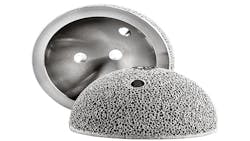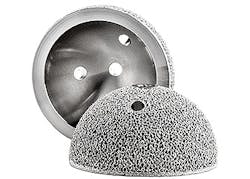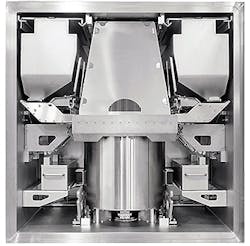Aerospace Forger Pursuing an 'Additive Manufacturing' Strategy
GKN Aerospace is forming a partnership with Arcam AB to develop and industrialize electron-beam manufacturing (EBM) methods for aerostructures and aero engine products, with efforts concentrated at a plant in Bristol, England. Arcam is a Swedish company that supplies additive manufacturing (AM) and EBM technologies for producing metal components. Its systems are used mainly to produce orthopedic implants and aerospace parts.
“We have been working with Arcam for some time exploring what we believe to be one of the most promising of the additive processes. Our aim has been to fully understand how EBM can be applied to our future aerostructures and aero engines portfolio,” explained GKN Aerospace senior vice president Russ Dunn. “Through this new strategic partnership with Arcam our combined additive manufacturing teams will now take the next steps toward fully industrializing this AM technology.”
The agreement is characterized as part of the GKN group’s broader R&D initiative into additive manufacturing, which includes four development centers within the GKN Aerospace business in North America and Europe.
The group’s position is that additive processes have “huge potential” for aerospace manufacturing, a sector which has growing demand for new, more efficient designs supplied more quickly and with greater consistency. GKN also noted the need for components that are lighter and more cost-effective and forged, cast, or machined parts, produced with less waste and lower emissions.
“We believe the array of processes that fall under the ‘additive’ umbrella will revolutionize manufacturing across every industrial sector,” Dunn offered, “particularly in aerospace where cost, weight, and performance are critical. Drawing on GKN Powder Metallurgy’s experience and our own extensive aerospace expertise we aim to develop a roadmap that will industrialize additive manufacturing for this sector.”
Electron-beam manufacturing is a process of melting powdered metals that have been deposited in a highly focused way, as defined by a CAD program in a layering sequence, building the design into complex, small- to medium-sized parts that require little finishing.
GKN called EBM “one of the most promising of the new ‘additive’ processes to meet the needs of the expanding future aerospace market.”
As the initial part of agreement GKN Aerospace ordered two Arcam Q20 EBM machines, to be installed at the Bristol additive manufacturing center, where GKN Aerospace and Arcam engineers will work together to develop EBM equipment and manufacture complex titanium structures “at the high volumes required to meet future demand.”
The capital value and other terms of the partnership were not announced.
The Arcam Q20 is an EBM system based on an earlier generation Arcam machine, Q10, for manufacturing aerospace parts like turbine blades and structural airframe components. While the technology and functions are similar, the newer version has a larger build envelope — (Ø350×380 mm) — that is thus capable of building larger components or parts in higher multiples.
“We are convinced that the close collaboration with GKN Aerospace will be key for further industrialization of our EBM technology in the aerospace industry,” commented Arcam CEO Magnus René.
About the Author
Robert Brooks
Editor/Content Director - Endeavor Business Media
Robert Brooks has been a business-to-business reporter, writer, editor, and columnist for more than 20 years, specializing in the primary metal and basic manufacturing industries. His work has covered a wide range of topics including process technology, resource development, material selection, product design, workforce development, and industrial market strategies, among others.
Currently, he specializes in subjects related to metal component and product design, development, and manufacturing—including castings, forgings, machined parts, and fabrications.
Brooks is a graduate of Kenyon College (B.A. English, Political Science) and Emory University (M.A. English.)



